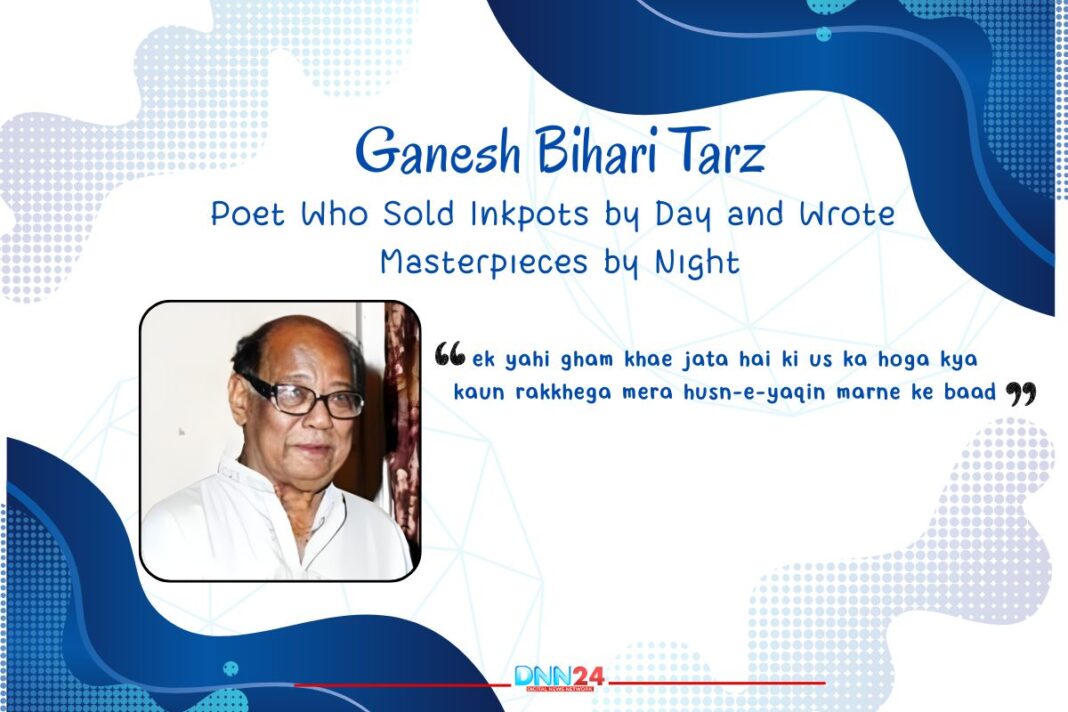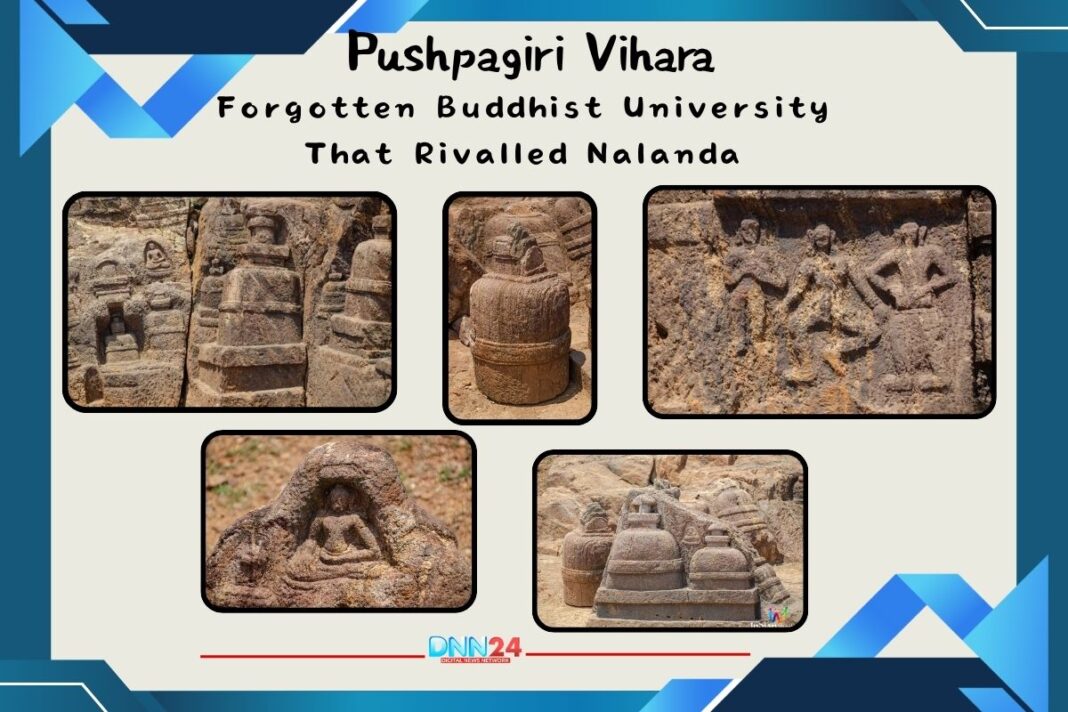In the dusty alleys of Lucknow, where most children dreamed of full meals, one boy dreamed in couplets. Ganesh Bihari Tarz was not born into literary royalty, nor did fame arrive at his doorstep wrapped in silk. His story is one that history nearly forgot, a tale of inkpots sold for survival, verses scribbled on borrowed paper, and a voice that rose from silence to shake the hearts of thousands.
mahaul sazgar karo main nashe mein hun
Ganesh Bihari Tarz
zikr-e-nigah-e-yar karo main nashe mein hun
While names like Faiz Ahmad Faiz echo through textbooks, Tarz remains a whisper, known only to those who seek poetry beyond the pages of privilege. Yet his life holds secrets that every aspiring writer needs to hear, truths about suffering, beauty, and the strange alchemy that turns pain into art.
ai gardisho tumhein zara taKHir ho gai
Ganesh Bihari Tarz
ab mera intizar karo main nashe mein hun
The Unheard Childhood: A Poet Born from Struggle
Ganesh Bihari Tarz was born in 1932, when Lucknow still carried the fragrance of its old charm amid poverty and hardship. His family lived through days of hunger and uncertainty, yet even as a child, Tarz had an uncommon gift for turning hardship into verse. He would recite couplets at home, small lines of comfort meant to lift his mother’s weary spirit and fill their dim rooms with warmth.
main tum ko chahta hun tumhin par nigah hai
Ganesh Bihari Tarz
aise mein e’tibar karo main nashe mein hun
School for Tarz was not a privilege but a pursuit. He studied in the narrow lanes of Lucknow, carrying worn-out books gifted by kind neighbours. To help his family, he sold inkpots and notebooks door-to-door. The earnings were meagre, but they kept hope alive. At dusk, after his rounds, he would write on scraps of paper, unpolished lines drawn from life around him, from beggars, neighbours, and the glow of the Gomti river at sunset.
aisa na ho ki saKHt ka ho saKHt-tar jawab
Ganesh Bihari Tarz
yaro sambhal ke war karo main nashe mein hun
For Tarz, poetry was not ornament but endurance. It was the voice of a shared humanity that transcended faith and class. The spirit of Lucknow’s mohallas, where harmony was a way of life, shaped his art. His verses would later earn him respect, though accurate recognition arrived only when the years had already quieted his struggle.
ab main hudud-e-hosh-o-KHirad se guzar gaya
Ganesh Bihari Tarz
Thukrao chahe pyar karo main nashe mein hun
Untold Turning Points: The Beginnings of Tarz’s Voice
Every life is shaped by specific moments that change its course forever. For Ganesh Bihari Tarz, such moments came early. As a teenager in Lucknow, he would slip quietly into mushairas, standing at the back to listen to poets like Josh Malihabadi and Firaq Gorakhpuri. He memorised their couplets, studied their rhythm, and dreamed that one day his own words might move hearts just as they did. Those evenings, where language shimmered with power, became his temple of learning.
KHud ‘tarz’ jo hijab mein ho us se kya hijab
Ganesh Bihari Tarz
mujh se nigahen chaar karo main nashe mein hun
Yet inspiration alone could not shape him; sorrow did. When an epidemic struck the city, Tarz lost his younger sister, whose laughter once filled their small home. The grief was unbearable, but instead of surrendering to despair, he began to write. His verses became raw, deeply human reflections of loss and endurance. Friends would often see him by the Gomti river, writing under a dim streetlamp until his fingers stiffened, the pages heavy with pain and truth.
dosti apni jagah aur dushmani apni jagah
Ganesh Bihari Tarz
farz ke anjam dene ki KHushi apni jagah
Through years of small jobs and endless struggle, he never abandoned poetry. Hardship deepened his empathy. He found beauty in ordinary life, a stranger’s kindness, a passing glance, and turned such moments into timeless verse. From grief and survival, Tarz discovered a voice that spoke not of privilege, but of humanity.
hum to sargarm-e-safar hain aur rahenge umr bhar
Ganesh Bihari Tarz
manzilen apni jagah aawargi apni jagah
Struggles, Friendships and Literary Triumph
Being a poet in mid-century India was rarely a gentle pursuit. Ganesh Bihari Tarz walked a road strewn with rejection and quiet struggle. Literary circles of the time prized lineage more than talent, and Tarz had neither a famous surname nor wealthy patrons to open doors. Yet he never faltered. Among a few kindred poets, he found companionship, people who recognised his raw brilliance and welcomed him despite his modest background.
pattharon ke des mein shishe ka hai apna waqar
Ganesh Bihari Tarz
dewta apni jagah aur aadmi apni jagah
He wrote alongside giants like Faiz Ahmad Faiz and Sahir Ludhianvi, though his name never reached their height. Tarz continued writing for small newspapers, often on an unpaid basis, driven not by ambition but by necessity. Poetry was both refuge and resistance. During the Partition, as the land bled and hatred spread, his verses became a balm. In his intimate gatherings, people sought comfort in his words and a reminder that compassion still endured.
gyan mana hai baDa bhakti bhi lekin kam nahin
Ganesh Bihari Tarz
aagahi apni jagah diwangi apni jagah
It was then he wrote his immortal couplet: “Ye mahal, ye maal-o-daulat sab yahiin rah jaainge, haath aaegi faqat do gaz zameen marne ke baad.” The simplicity struck deeply, a truth born of hunger, humility, and faith. When his first collection appeared, praise was quiet but heartfelt. Tarz’s greatest joy remained nurturing young poets, proving that generosity can bloom even in scarcity.
subh hain sajde mein hum to sham saqi ke huzur
Ganesh Bihari Tarz
bandagi apni jagah aur mai-kashi apni jagah
The Eternal Inspiration: Tarz’s Legacy and Lessons
In his later years, Ganesh Bihari Tarz experienced both recognition and renewed hardship. Age brought illness, and the loss of loved ones weighed heavily. The world around him changed, noisier, hurried, and often indifferent to reflection. Yet Tarz never grew resentful.
sara aalam hai tarannum-KHez ai shair-nawaz
Ganesh Bihari Tarz
sher ki apni jagah aur ‘tarz’ ki apni jagah
He kept writing, guided by a belief in kindness and truth. When his eyesight began to fade, young admirers gathered to record his dictations, eager to preserve his fading voice. Even weakened, his spirit remained steady, his poetry still filled with tenderness and conviction.
jism to miTTi mein milta hai yahin marne ke baad
Ganesh Bihari Tarz
us ko kya roen jo marta hi nahin marne ke baad
What defined Tarz most was humility. Success never altered the man who once sold inkpots in Lucknow’s streets. He carried poverty’s memory with quiet dignity, allowing it to keep his verse honest and human. His poetry endures not for its grandeur, but for its truth – heartfelt and straightforward lines that speak to ordinary lives.
farz par qurban hone ka ek apna husn hai
Ganesh Bihari Tarz
aur ho jata hai kuchh insan hasin marne ke baad
Tarz’s legacy reaches beyond literature. His journey reminds us to find grace amid difficulty, to choose honesty over ease, and to keep creating even when unseen. He proved that greatness is not born of privilege but of perseverance. Through his verses, Tarz transformed pain into beauty, showing that art, when sincere, can outlast both struggle and time, illuminating lives long after the poet is gone.
Also Read: Bahadur Shah Zafar: The Emperor Who Lost Everything But Refused to Stop Writing Poetry
You can connect with DNN24 on Facebook, Twitter, and Instagram and subscribe to our YouTube channel.



